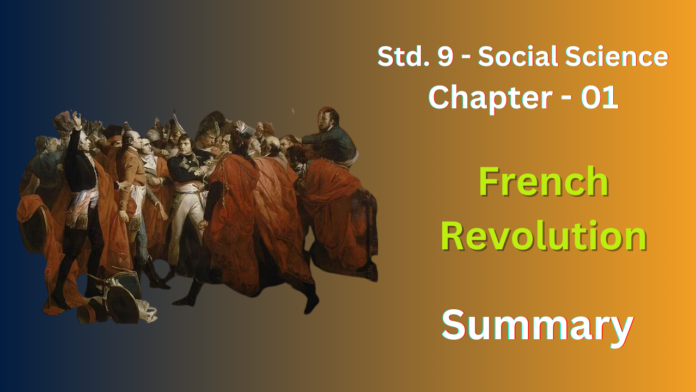NCERT Solutions for Class 9 History Chapter 1
Here’s a summary of the chapter “The French Revolution” you might find in your 9th-grade social science textbook (likely History):
Seeds of Discontent
The French Revolution, a period of radical social and political upheaval, began in 1789. However, the seeds of discontent were sown long before. Here are some key factors:
- Unequal Social Structure: French society was divided into three estates: privileged clergy and nobility (First and Second Estates), and the common people (Third Estate). The Third Estate shouldered most of the tax burden while having little political power.
- Economic Hardships: France faced a financial crisis due to wars, lavish spending by the monarchy, and a poor harvest. This led to widespread poverty and hunger among the common people.
- Enlightenment Ideas: The ideas of philosophers like Voltaire, Rousseau, and Montesquieu emphasizing liberty, equality, and popular sovereignty inspired the Third Estate to question the absolute monarchy.
Storming the Bastille
The storming of the Bastille prison on July 14, 1789, is considered a turning point. It symbolized the people’s defiance of royal authority and the beginning of the revolution.
The Rise of New Ideas
The National Assembly, formed by representatives of the Third Estate, abolished feudal privileges and declared the “Declaration of the Rights of Man and of the Citizen,” guaranteeing basic rights to all citizens. A constitutional monarchy was established, limiting the king’s power.
Radical Phase and Reign of Terror
The revolution entered a more radical phase in 1792. The monarchy was abolished, and France became a republic. However, this period also saw violence and instability. The Committee of Public Safety, led by Robespierre, instituted a “Reign of Terror” to eliminate enemies of the revolution, leading to many executions.
End of the Revolution and Rise of Napoleon
The Reign of Terror came to an end in 1794. The revolution ushered in a new era of social reforms, including abolishing slavery in French colonies. However, political instability Acontinued. Napoleon Bonaparte eventually seized power in 1799, bringing the revolution to an official end.
Impact of the French Revolution
The French Revolution had a profound impact on the world:
- Spread of Revolutionary Ideas: The ideals of liberty, equality, and fraternity inspired revolutions and reforms across Europe and beyond.
- End of Absolute Monarchy: The revolution weakened the concept of absolute monarchy and paved the way for more democratic forms of government.
- Rise of Nationalism: The revolution fostered a sense of national identity in France and influenced the rise of nationalism in other parts of Europe.
NCERT Solutions for Class 9 History Chapter 1
Questions:
1. Describe the circumstances leading to the outbreak of revolutionary protest in France?
Ans : A simmering pot of social and economic discontent boiled over into revolutionary protest in France.
Social Inequality: French society was divided into three estates. The First and Second Estates (clergy and nobility) enjoyed privileges like tax exemption, while the Third Estate (everyone else) shouldered the tax burden and had little political power. This resentment fueled revolutionary fervor.
Economic Hardship: France’s financial crisis, caused by wars, extravagant royal spending, and poor harvests, led to widespread poverty and hunger among the Third Estate. This economic misery became a major catalyst for protest.
Enlightenment Ideas: The ideals of liberty, equality, and popular sovereignty championed by philosophers like Voltaire, Rousseau, and Montesquieu resonated with the Third Estate. These ideas challenged the absolute monarchy and gave intellectual ammunition to the revolutionaries.
Political Gridlock: King Louis XVI’s attempts to solve the financial crisis by raising taxes on the Third Estate were met with resistance. The Estates General, a representative body, deadlocked due to the voting system that favored the privileged estates. This lack of representation further inflamed the Third Estate.
2. Which groups of French society benefited from the revolution? Which groups were forced to relinquish power? Which sections of society would have been disappointed with the outcome of the revolution?
Ans :
Beneficiaries:
- The Wealthy Third Estate: Wealthy merchants, professionals, and landowners within the Third Estate gained the most. The revolution abolished feudal dues they previously paid to the nobility and clergy. Additionally, the ideals of equality opened doors to political participation and social mobility.
- Peasants: Peasants were relieved of burdens like feudal dues and serfdom. However, many still faced poverty, and land redistribution wasn’t as extensive as some might have hoped.
Losers:
- Clergy and Nobility: These privileged groups lost their titles, landholdings, and exemptions from taxes. Many nobles fled France, while others faced execution during the Reign of Terror.
- The Poor: While some benefited from price controls, overall, the revolution did little to address the dire poverty of the urban working class.
Disappointed Groups:
- Radical Revolutionaries: Those who envisioned a complete dismantling of social hierarchies and a more radical republic were disillusioned by the rise of Napoleon and a more moderate government.
- Women: Despite early inclusion in revolutionary ideas, women were ultimately denied political rights and relegated back to traditional roles.
- Slaves in Colonies: While slavery was abolished in French colonies in 1794, it was later reinstated by Napoleon, dashing the hopes of enslaved people.
3. Describe the legacy of the French Revolution for the peoples of the world during the nineteenth and the twentieth centuries.
Ans :The French Revolution’s legacy reverberated far beyond France’s borders, impacting the course of history throughout the 19th and 20th centuries across the globe. Here’s a breakdown of its key influences:
1. Spread of Revolutionary Ideals: The ideals of liberty, equality, and fraternity became a rallying cry for people yearning for change. Revolutions and reform movements in Europe, Latin America, and beyond were inspired by these principles. Thinkers and revolutionaries like Simon Bolivar in South America drew inspiration from the French model.
2. Challenge to Absolute Monarchy: The dismantling of the French monarchy weakened the concept of absolute rule across the globe. Monarchs across Europe were forced to make concessions and consider representative forms of government.
3. Rise of Nationalism: The revolution fostered a sense of national identity in France. This concept resonated with people in other parts of Europe and beyond, contributing to the rise of nationalism and unification movements in countries like Italy and Germany.
4. Inspiration for Anti-Colonial Movements: The ideals of liberty and self-determination inspired people living under colonial rule to fight for independence. Leaders like Toussaint L’Ouverture in Haiti used revolutionary principles to challenge European domination.
5. Debates on Democracy and Citizenship: The revolution sparked debates about the nature of democracy, citizenship rights, and popular sovereignty. These discussions laid the groundwork for the expansion of voting rights and democratic reforms across the world.
4. Draw up a list of democratic rights we enjoy today whose origins could be traced to the French Revolution.
Ans : Here’s a list of democratic rights we enjoy today that have their origins traced back to the French Revolution:
- Equality Before the Law: The revolution challenged the concept of a privileged elite and established the principle that everyone is subject to the same laws.
- Right to Liberty: The French emphasis on individual liberty led to the recognition of basic freedoms like freedom of movement, speech, and assembly.
- Right to Participate in Government: The revolution ushered in ideas of popular sovereignty, where citizens have a say in their government, either directly or through elected representatives.
- Right to Property: The revolution enshrined the right to own property, which was previously restricted for some social classes.
5. Would you agree with the view that the message of universal rights was beset with contradictions? Explain.
Ans : Absolutely, there is strong reason to agree that the message of universal rights during the French Revolution was beset with contradictions. Here’s a breakdown of why:
Contradictions in Implementation:
- Limited Franchise: The ideals of the “Declaration of the Rights of Man and of the Citizen” weren’t fully reflected in practice. While it preached equality, only men over a certain age and property threshold could vote, excluding women, the poor, and young men.
- Exclusion of Women: Women were largely left out of the revolutionary gains. Despite early involvement, they were denied political rights and relegated back to traditional domestic roles.
- Colonial Contradictions: The French championed liberty abroad while maintaining a colonial empire where basic rights weren’t extended to enslaved people. The abolition of slavery in 1794 was later reversed by Napoleon.
Contradictions in Wording:
- Ambiguous Language: The Declaration itself contained some ambiguous language. Phrases like “law has the right to forbid only actions injurious to society” didn’t address individual rights violations.
- Unclear Definitions: Concepts like “liberty” and “equality” weren’t clearly defined, leading to disagreements and power struggles within the revolution itself
6. How would you explain the rise of Napoleon?
Ans : Napoleon Bonaparte’s rise to power was a confluence of several factors that capitalized on the chaos and yearning for stability following the French Revolution. Here’s a breakdown of the key elements:
Military Victories: Napoleon’s exceptional military skills and strategic brilliance were undeniable. His early victories in Italy secured French dominance and made him a national hero. These victories bolstered public support and established him as a powerful figure.
Political Instability: The French government following the revolution was weak and plagued by internal conflict. Napoleon, through strategic alliances with various political factions, was able to position himself as a strong leader capable of restoring order and stability. This desire for stability resonated with the war-weary French public.
Coup d’État: In 1799, Napoleon staged a successful coup d’état (the overthrow of the government) known as the “Coup of 18 Brumaire.” This event allowed him to dismantle the existing government and establish himself as the First Consul, effectively concentrating power in his hands.
Charisma and Propaganda: Napoleon was a skilled manipulator of public opinion. He cultivated a charismatic image and used propaganda to portray himself as a strong and decisive leader who could restore French glory. This image resonated with the public yearning for a strong leader after years of revolution.
Public Disillusionment with Revolutionaries: Many French citizens became disillusioned with the radicalism and violence of the later stages of the revolution. Napoleon, by promising stability and a return to more moderate ideals, was able to position himself as a welcome alternative.
Napoleon’s rise wasn’t inevitable: It was a combination of his military prowess, political maneuvering, and the public’s desire for stability that allowed him to seize power and eventually crown himself Emperor.
FAQ’s
What was the French Revolution?
The French Revolution was a social and political upheaval in France that began in 1789. Its main goal was to overthrow the absolute monarchy and establish a government based on democratic principles.
What were the main causes of the French Revolution?
The main causes of the French Revolution included economic hardship, social inequality, absolute monarchy, and the influence of Enlightenment ideas. These factors collectively led to widespread discontent and the desire for change.
What are the major documents written during the French Revolution?
Major documents written during the French Revolution include the “Declaration of the Rights of Man and of the Citizen,” which outlines the fundamental principles of the Revolution.
How did the French Revolution impact other countries?
The French Revolution inspired revolutionary movements in other countries, promoting ideas of equality, liberty, and republicanism. It had a profound influence on political developments and reforms worldwide.
What is the modern-day impact of the French Revolution?
The French Revolution laid the foundation for modern democratic societies. It strengthened the concepts of human rights, civil liberties, and just societies, which remain integral to contemporary politics and society.


